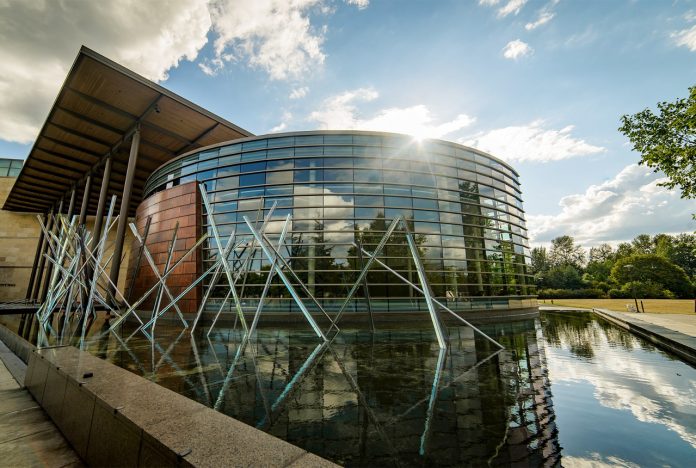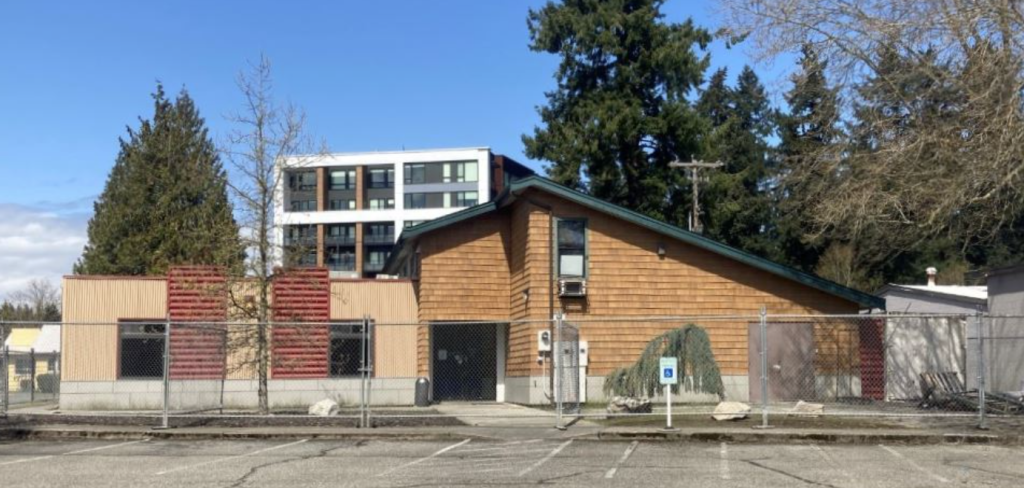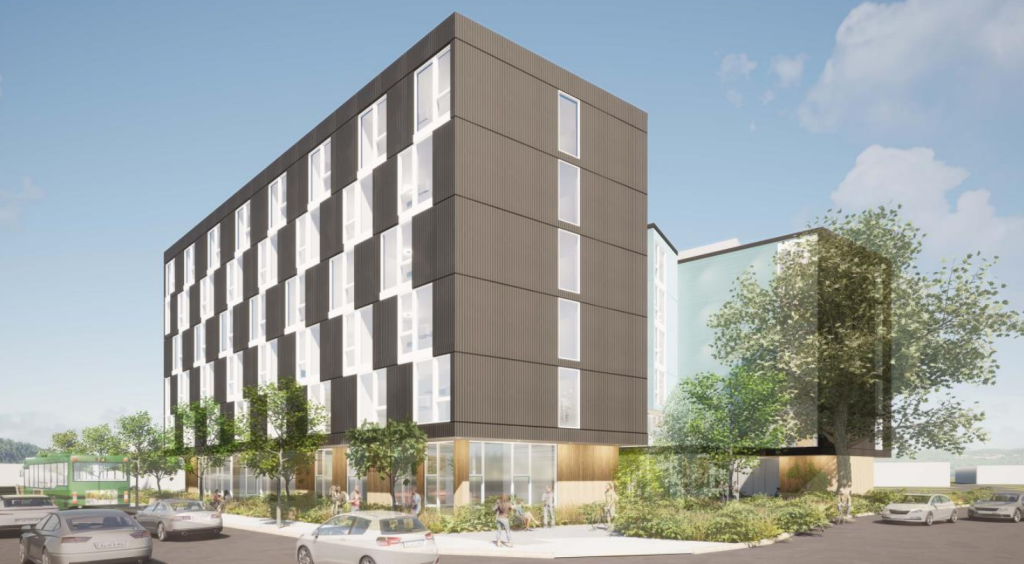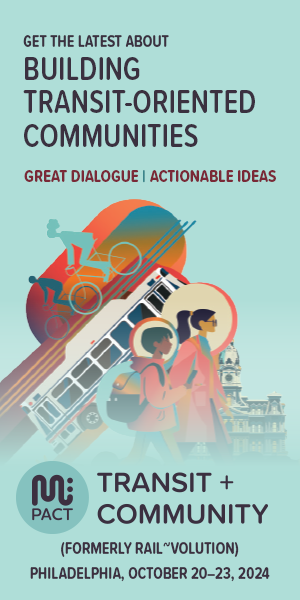
The City of Redmond is acting quickly to keep 100 affordable homes on track to be built after a fully-formed plan to build them in Kenmore was derailed by the Kenmore City Council over the past few months.
On Tuesday night, the Redmond City Council approved moving forward with a land transfer that will allow Plymouth Housing to construct 100 units of permanent supportive housing on a city-owned parcel in downtown Redmond. Redmond’s quick action is set to allow Plymouth to keep an otherwise fully-funded project designed to provide housing for people directly exiting homelessness intact, without the planned funding and land from Kenmore. The vote was 5-1, with Councilmember Jeralee Anderson the sole no.
The new site is located on Cleveland Street, on a property that the City of Redmond purchased for $5.5 million dollars with the express purpose of developing affordable housing at that location. Located steps from the planned Downtown Redmond light rail station, the property is currently vacant, its last occupant a dog daycare. Last fall, the building on the site was demolished. In addition to providing the land, $3.2 million in funds from the City of Redmond earmarked for affordable housing will take the place of direct funding that had been planned to be contributed by Kenmore.
“The circumstances that brought us to this shared opportunity are unprecedented,” Karen Lee, Plymouth Housing’s CEO, told the council Tuesday. “Given the unusual nature of this opportunity, this process requires quick action.”
A staff report provided to the council this week details just how quickly the idea of taking over the project from Kenmore came together over the course of a few days in late January, with Kenmore Mayor Nigel Herbig confirming to Redmond Mayor Angela Birney his support for the idea on January 23, a day after Birney confirmed that the City Council was on board with pursuing the project. That quick action will likely open the City up to criticism that they haven’t been transparent or accepting of public feedback during the process, despite the fact that the entirety of the approval process for a facility like this lays ahead, including all of the opportunities for public comment that entails.

“This project has momentum now,” Carol Helland, Redmond’s Planning & Community Development Director, told the Council, noting the fact that the City of Kenmore backing out was leading to increased time pressure. “The problem is, generally, that city funds are the first in, and they support securing the additional funds […] so the fact that the city funds were the ones that were previously jeopardized actually places this project in greater jeopardy because the foundational funding disappeared.”
“What Redmond is seeking to do is step into the shoes of that foundational funding, providing the land and the $3.2 million that was previously committed, to ensure that Plymouth has the leverage to continue to negotiate on this project. If there’s not a home for this project, the opportunity actually disappears,” Helland said.
On the whole, the Redmond City Council appears soundly behind moving forward, referencing past commitments that the City has made to pursue affordable housing opportunities. After a question and answer session with Plymouth Housing and city staff Tuesday night, it was Council President Vanessa Kritzer who made a motion to move forward Tuesday.
I’m making this motion because I do think this is an incredible opportunity for our city,” Kritzer said, referencing the tens of millions of dollars that has already been assembled to complete the project. “That’s a huge amount of resources for us to be able to provide something that we as a city have stated repeatedly is a goal for us.”
Redmond’s share of King County’s overall housing growth target over the next two decades adds up to 20,000 new units of housing, with around 3,700 of those units expected to be needed as permanent supportive units available to people with little to no incomes as they directly exit homelessness. The City’s Housing Action Plan, adopted in 2021, calls for Redmond to partner with nonprofits, developers, and faith-based organizations to increase the number of affordable units being built in the city.
“I think the city of Redmond is going to look back on this amazing opportunity, and tonight we can be really proud when we take this vote,” Councilmember Melissa Stuart said. “And I think one of my main messages for those who’ve been robust in their feedback over the last couple of days is: this is not the first permanent supportive housing that we’re going to provide in the City of Redmond. This isn’t the last permanent supportive housing that we’re gonna bring to Redmond. Redmond needs a lot more of this.”
The facility would be Plymouth’s second on the Eastside, after the 92-unit Plymouth Crossing in Bellevue’s Eastgate neighborhood that opened in 2023. And it would also be Redmond’s second foray into approving permanent supportive housing, following the King County-led purchase of Overlake’s Silver Cloud Inn.
The land transfer process that started Tuesday night is contingent on the entire financing plan originally assembled for the Kenmore site staying intact. That finance plan includes a broad array of sources, including funding from the Washington State Housing Finance Commission, the National Housing Trust Fund, and A Regional Coalition for Housing (ARCH), which pools funding for affordable housing from cities across the entire Eastside.
Things may have turned out very differently if not for Kenmore’s City Council. In January, that body voted 5-2 to not move forward with a development agreement that would allow Plymouth to build its fully-designed building on city-owned property on Bothell Way NE, despite the fact that Kenmore city staff had been working directly on the project for the past 18 months. That vote was essentially the last opportunity to move the project forward, after an earlier 6-1 vote against the project in mid December. Both meetings were appended with hours of testimony of residents of Kenmore and nearby cities, many vocally opposed to the idea of adding permanent supportive housing to downtown Kenmore.

The episode has captured regional attention, given the significant consensus for the need for more affordable housing, particularly deeply affordable housing that isn’t really possible without direct government subsidy. King County Executive Dow Constantine, in the Seattle Times, called Kenmore’s actions an “embarrassing failure of leadership.”
The Kenmore Council’s actions even appeared to be a significant driving force behind a piece of state legislation, introduced fairly late into this year’s session by Representative Strom Peterson (D-21, Edmonds). HB 2474, which passed off the House floor earlier this week on a largely party-line vote, would add additional state oversight onto cities who aren’t approving permits — or development agreements — for transitional and permanent supportive housing. If cities continue to deny permits, state funds deemed as fairly essential to the operation of government, like motor vehicle taxes that fund transportation improvements, could be withheld.
In Redmond, however, there doesn’t seem to be much hesitation that the City should be moving forward with this project, without any need for intervention from the state.
“I’m very proud of our city right now, because we’ve talked about our values, we’ve talked about increasing a sense of belonging,” Redmond Councilmember Angie Nuevacamina said Tuesday night. “We’ve seen the data, we know that [having a] sense of belonging extends life expectancy, sense of belonging also decreases addiction considerably. So I’m very proud that we’re acting with integrity, and that we’re doing something that is based in fact, and not not being too caught off by a sense of fear.”
UPDATE: The City of Redmond released a public statement Wednesday touting the partnership that was secured Tuesday night, and its alignment with City goals.
“This is one of the City’s top priorities and we believe every person in our community has a right to affordable housing,” Redmond Mayor Angela Birney said in the statement. “We’re encouraged that this project has the opportunity to help those who need it and appreciate the support of everyone who has helped to make this happen.”
The statement also included strong support from County leadership, as well as Governor Jay Inslee. “Nearly every community in Washington is facing a housing or homelessness crisis,” Inslee said in his statement. “The only way forward is for every city to lean in together in providing housing and services. The city of Redmond is setting a great example by stepping up to ensure we don’t lose a 100-bed project.”
“If we are to solve our regional housing crisis, every jurisdiction in King County will have to do our part and work together,” said King County Councilmember Claudia Balducci, who represents the district that includes most of Redmond. “The City of Redmond and the Redmond community are rising to the challenge by making this important project a reality. With this action, they are showing the way for all of us to live up to our values and provide housing for all.”
Correction: This story has been updated to clarify that the proposed site in Redmond is currently vacant.
Ryan Packer lives in the Summit Slope neighborhood of Capitol Hill and has been writing for the The Urbanist since 2015. They report on multimodal transportation issues, #VisionZero, preservation, and local politics. They believe in using Seattle's history to help attain the vibrant, diverse city that we all wish to inhabit. Ryan's writing has appeared in Capitol Hill Seattle Blog, Bike Portland, and Seattle Bike Blog, where they also did a four-month stint as temporary editor.




